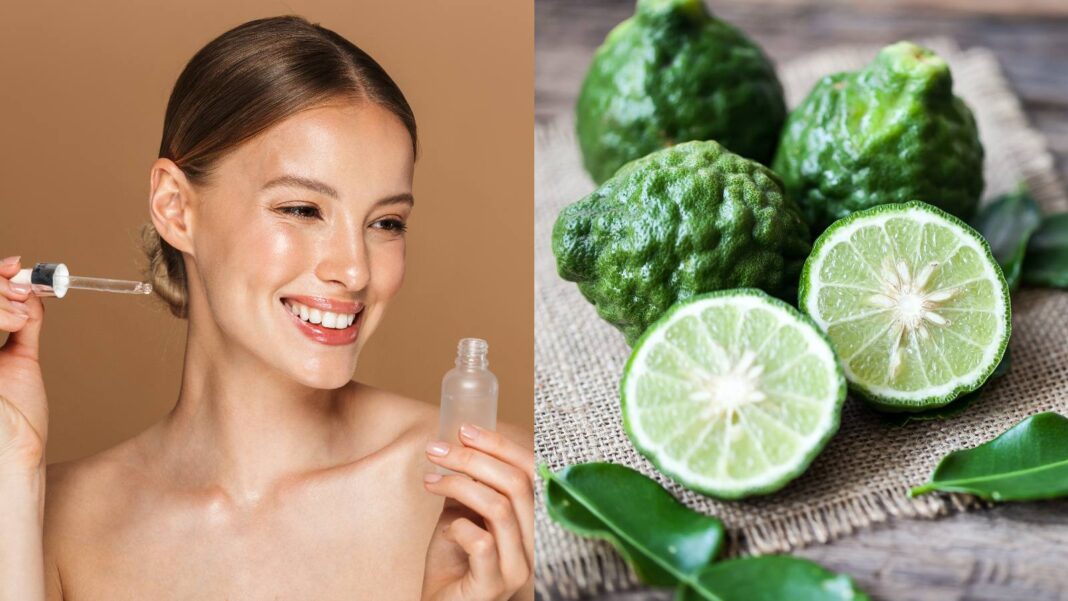Bergamot has been used as a herbal remedy for years. Here’s how to use bergamot for skin to make it smooth and radiant.
Given the pollution, stress, and several other environmental factors, your skin can suffer a great deal and not glow like you want. However, adding some healthy ingredients to your skincare routine can help. You can use bergamot for your skin to make it look healthy and glow. Bergamot essential oil, extracted from this citrus delight, is an essential oil that offers several beauty benefits. With its refreshing aroma and potent properties, this golden elixir offers a holistic approach to skincare. Beyond its delightful fragrance, bergamot oil soothes inflammation and boosts radiance. It helps combat acne and even out your skin tone and offers several other benefits for your skin.
What is bergamot?
Bergamot is a citrus fruit, often known as bergamot orange, that is native to Southern Italy. Its scientific name is Citrus bergamia. It is about the size of an orange and smells similar, but it has a green or yellow peel with a bitter or sour flavour. The fruit is sometimes considered unpalatable due to its taste. People generally prefer to use its oils or juice to make tea, vitamins, extracts, and essential oils. These products are amazing for glowing skin, reducing anxiety, weight loss, and more.

Benefits of bergamot for skin
Bergamot essential oil, extracted from the peel of the bergamot fruit, is a skincare powerhouse full of benefits. Here’s how you can use bergamot for skin.
1. Contains antibacterial and antiseptic properties
Bergamot oil is rich in potent antibacterial and antiseptic properties that help combat acne-causing bacteria, preventing outbreaks and promoting smoother skin, found a study published in the Italian Journal of Food Safety. It can also help treat minor skin infections and wounds. So, if you have acne-prone skin or have encountered minor skin infections, using bergamot essential oil for your skin can be beneficial.
2. Keeps oiliness and dryness away
“One of bergamot oil’s amazing properties is its ability to regulate sebum production. Whether you have oily, dry, or combination skin, this oil helps to balance oiliness and prevent excessive dryness,” explains dermatologist Dr DM Mahajan. If you are looking for a stop solution for skin balancing, start using bergamot essential oil for amazing results.
3. High in anti-inflammatory properties
Are you dealing with acne, redness, and irritation? Incorporating bergamot essential oil into your skincare routine can be helpful. Bergamot oil is rich in anti-inflammatory compounds, found a study published in the Pharmaceutical Biology Journal. It effectively soothes redness, irritation, and inflammation, associated with acne, eczema, and other skin conditions. Bergamot can also help soothe sensitive skin and alleviate irritation.
4. Gives glowing skin
If you do not like spending money and time on salons, we have an amazing solution for you! Using bergamot essential oil can be helpful. “This citrus oil is known for its ability to brighten the skin. It can help to reduce acne scarring, hyperpigmentation, and uneven skin tone, revealing a more radiant and bright complexion,” says the expert.
5. Reduces stress
If you are stressed, expect it to show on your skin because stress can have a negative effect on your skin, as per Harvard Medical School. While stress is inevitable, it can be avoided. While reducing stress has no direct skin benefits, it does indirectly promote a healthy skin. Bergamot oil has a relaxing aroma and can help reduce tension and anxiety, as found in a study published in the Food and Science Nutrition Journal.
How to use bergamot for skin?
Here is a step-by-step guide on ways to use bergamot for glowing skin, as explained by the expert.
1. Acne-fighting spot mask
Ingredients
Select Topics of your interest and let us customize your feed.
- 1 teaspoon of aloe vera gel
- 2 drops of bergamot oil
Method
- Mix 1 teaspoon of aloe vera gel with 2 drops of bergamot oil.
- Apply directly to pimples before bedtime.
2. Balancing facial toner
Ingredients
- 2 ounces of witch hazel
- 5 drops of bergamot oil
Method
- Combine 2 ounces of witch hazel with 5 drops of bergamot oil.
- Store in a dark glass bottle and apply to clean skin with a cotton pad.
3. Brightening face mask
Ingredients
- 1 tablespoon of yoghurt
- 1 teaspoon of honey
- 2 drops of bergamot oil
Method
- Mix 1 tablespoon of yoghurt with 1 teaspoon of honey and 2 drops of bergamot oil.
- Apply to clean skin for 15 minutes, then rinse off with warm water.
4. Soothing body oil
Ingredients
- 2 ounces of sweet almond oil
- 5 drops of bergamot oil
- 3 drops of lavender oil
Method
- Combine sweet almond oil with bergamot oil and lavender oil for relaxation.
- Massage the mix into your skin after showering. It will deeply hydrate your skin.
5. Energising bath soak
Ingredients
- 5 drops of bergamot oil
- Epsom salt
Method
- Add 5 drops of bergamot oil to a handful of Epsom salts.
- Pour into a warm bath and soak for 15-20 minutes.
- 6. Hair rinse for shine
Ingredients
- 2 drops of bergamot oil
- 1 cup of water
Method
- Mix 2 drops of bergamot oil with 1 cup of water.
- Pour over hair after shampooing, leave for a few minutes, then rinse.
7. Exfoliating body scrub
Ingredients
- ½ cup of sugar
- ¼ cup of coconut oil
- 3 drops of bergamot oil
Method
- Combine 1/2 cup sugar, 1/4 cup coconut oil, and 3 drops of bergamot oil.
- Gently massage into wet skin, then rinse off.
Also Read: Want glowing skin? Try these 3 DIY body scrubs for instant results
8. Calming face massage
Ingredients
- 1 tablespoon of coconut oil
- 2 drops of bergamot essential oil
Method
- Mix 1 tablespoon of coconut oil and 2 drops of bergamot essential oil.
- Gently massage your skin until it gets absorbed.
9. Face scrub
Ingredients
- 1 tablespoon of oatmeal
- 2 drops of bergamot essential oil
- 2 tablespoons of water
Method
- Mix bergamot oil with oatmeal and water in a bowl.
- Gently apply it to your face.
- Leave it for 10-15 minutes.
- Wash it off with running water.

Side effects of bergamot for skin
While bergamot is generally safe, potential side effects include:
- Bergamot has a citrus content which can cause skin irritation, allergic reactions, or phototoxicity.
- Increased sensitivity to sunlight after using bergamot oil may lead to sunburn or blisters on your skin.
- Using bergamot while on certain medications such as blood thinners or antibiotics should be avoided.
- Bergamot contains astringent properties which can cause skin dryness or flakiness
- Overuse or undiluted application of bergamot may lead to skin irritation or discomfort.
It is advisable to consult a healthcare professional before using bergamot oil, especially if you have sensitive skin or allergies. Also, you should always do a patch test first.
Frequently Asked Questions (FAQs)
1. Does bergamot oil make you sleepy?
When used in aromatherapy, it may help reduce anxiety, which leads to better sleep, as found in a study published in the Complementary Therapies in Clinical Practice. You may find that using it as aromatherapy before bedtime helps you fall asleep more easily.
2. Does bergamot oil repel mosquitoes?
Bergamot’s smell may serve as a natural insect repellent. According to a study published in the Insects Journal, this effect is less pronounced than that of other essential oils. To use, combine a few drops with water and pour it into a clean misting container. You can then apply the spray to your clothing or certain regions of your skin to help repel mosquitos and other insects.









